Celebrating Indigenous Women and 2SLGBTQIA+ Defenders
Today on National Indigenous Peoples Day, join Amnesty International Canada to honour, uphold, and celebrate Indigenous women and 2SLGBTQIA+ defenders who are putting their lives on the frontlines to protect their lands and waters for future generations, and in so doing, honour their ancestors, cultural heritage and sacred connections to nature.
As matriarchs, mothers, grandmothers, aunties, knowledge keepers, Elders and Caretakers, women and 2SLGBTQIA+ defenders are protecting their sacred lands and waters to heal their families and communities from intergenerational trauma caused by systemic racism and violence in Canada. These defenders of the lands and waters also share their traditional knowledge and cultural practices with future generations and teach them their original roles of conserving and protecting the environment.
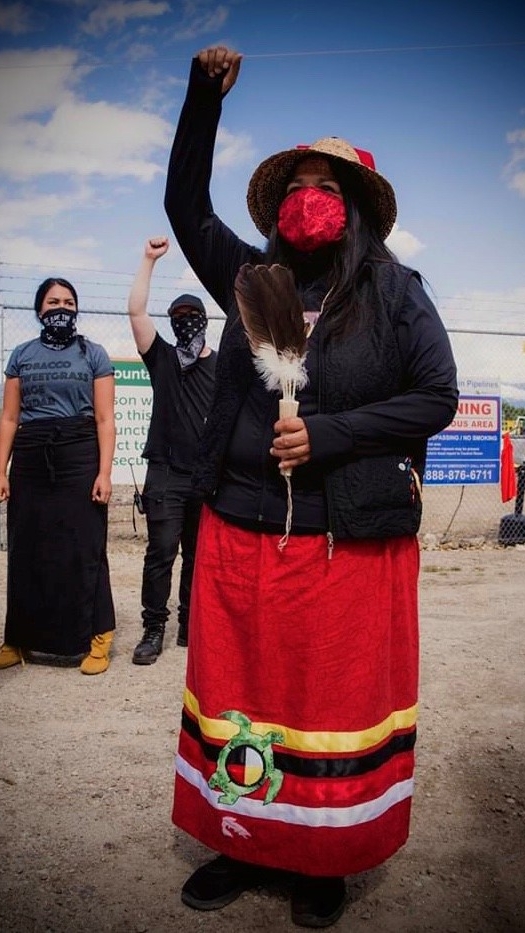
Canada’s long history of environmental racism
All over the world, Indigenous, Black and Racialized Peoples feel the disproportionate impact of environmental degradation, climate crises, colonial expropriation, and resource extraction. This is also known as environmental racism.
‘Environmental racism is racial discrimination in environmental policymaking… the enforcement of regulation of laws… the deliberate targeting of our communities for toxic waste disposal and polluting industries…the (state) sanctioning of poisons and pollutants in our communities… and the history of excluding our people from decision making and regulatory bodies.’
Rev. Benjamin F. Chavis, Jr., Civil Rights Activist
Canada has a long history of environmental racism toward Indigenous, Black, and Racialized communities.
In the 1960s, in Africville, Nova Scotia, a community of formerly enslaved Black people was pushed out because of regional dumping and the municipal government’s gradual expropriation of their lands.
In Sarnia, Ontario, toxic pollutants emanating from air-polluting facilities owned by Ontario Power, Shell Canada and Imperial Oil continue to harm the Aamjiwnaang First Nation and neighbouring communities.
The Grassy Narrows First Nation has endured six decades of mercury poisoning of their rivers, which has harmed the health of community members. Earlier this year, the Grassy Narrows Nation formed the First Nations Land Defence Alliance with the Big Trout Lake First Nation, Wapekeka First Nation and Neskantaga First Nation to collectively defend their lands and territories against dispossession and resource extraction by the provincial government and mining companies along the James Bay Lowlands, also known as the ‘Ring of Fire’ region.
In British Columbia, facing state-sanctioned criminalization, harassment, and abuse, the Wet’suwet’en and Secwépemc Nations continue to fight the construction of the Coastal GasLink and Trans Mountain pipelines being built on their lands. Following his visit to Canada in March 2023, the UN Special Rapporteur on the Rights of Indigenous Peoples, Francisco Calí, expressed concern about the ongoing militarization of Indigenous lands and the criminalization of Indigenous land and water defenders.
Various international human rights bodies have also called out Canada’s treatment of Indigenous Peoples. Article 10 of the United Nations Declaration on the Rights of Indigenous Peoples (UNDRIP) clearly stipulates that Indigenous Peoples must not be forcibly removed from their lands and relocation will not occur without their free, prior and informed consent.
In accordance with UNDRIP, the United Nations Committee on the Elimination of Racial Discrimination has called on Canada to stop the construction of the Site C dam and the Coastal GasLink and Trans Mountain pipelines until the federal and provincial governments have had meaningful engagements with affected Indigenous Nations and they have also provided their consent for the projects.
Violence against the land and waters is violence against Indigenous women, girls, and 2SLGBTQIA+ People
From Canada to Brazil, Indigenous Peoples across the world are saying that environmental racism and the colonial dispossession of their lands are intimately tied to systemic violence against Indigenous women, girls, Two Spirit and gender-diverse people.
The struggles to preserve our land and our bodies are two faces of the same struggle.’
Annita Lucchesi, Cheyenne Nation, land defender & human trafficking survivor

Environmental issues, resource extraction and climate crises perpetuate violence against women, girls and gender-diverse people, manifesting in the sexual assault, human trafficking and disproportionately high rates of missing and murdered Indigenous women, girls and Two-spirit people (MMIWG2S) in extractive industry localities.
For instance, more than 600 Indigenous women and girls have gone missing and been murdered since the 1950s along the Highway 16 corridor. Infamously known as the ‘Highway of Tears,’ the 725-kilometre-long section of the Trans-Canada Highway in northern British Columbia runs through the Wet’suwet’en Nation’s territory. According to RCMP records, 18 unsolved MMIWG2S cases remain, but affected families and activists know that the exact number of missing and murdered Indigenous women is yet to be determined.
Resource extraction projects lead to the expansion of ‘man camps,’ temporary extractive industry labour camps that bring an influx of transient male workers to Indigenous territories. These ‘man camps’ are tied to high rates of sexual and gender-based violence and trafficking experienced by Indigenous women, girls and 2SLGBTQIA+ people. Expert witnesses, institutional witnesses and Knowledge Keepers clearly underlined this connection to the National Inquiry into Missing and Murdered Indigenous Women and Girls:
‘Resource extraction projects can drive violence against Indigenous women in several ways, including issues related to transient workers, harassment and assault in the workplace, rotational shift work, substance use and addictions, and economic insecurity.’
—National Inquiry into Missing and Murdered Indigenous Women and Girls
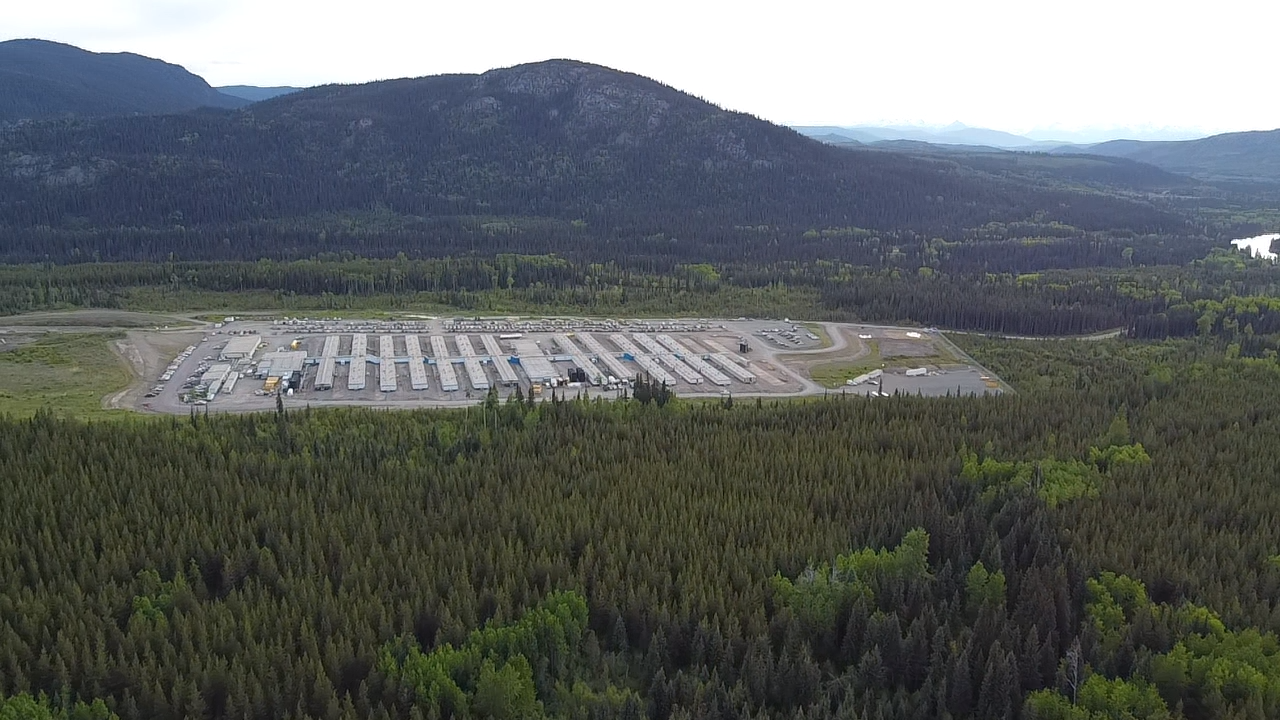
Violence against women and 2SLGBTQIA+ land and water defenders
In addition to their experiences of mass surveillance, militarization and criminalization, sexual and gender-based violence is especially common for Indigenous women and 2SLGBTQIA+ land defenders and water protectors. Sexual and gender-based violence are used as tools to dehumanize and silence, and actively halt the activism, cultural healing, and community-building work of Indigenous women and 2SLGBTQIA+ defenders, matriarchs and Elders.
‘We are not protestors. We are land defenders. Do you understand what we’re trying to do here? Do you not get what can happen? What they’re destroying is going to be gone forever… I’m doing this for everybody’s children (and) grandchildren…We need to be able to rely on our land and water for fish, hunting, medicines, shelter, everything… Educate yourselves! Stop making us out to be terrorists on our own land!’
—Indigenous land and water defender
Indigenous women and 2SLGBTQIA+ land and water defenders who are on the frontlines of climate justice, ‘land back,’ and ecological justice movements are often represented as ‘terrorists’ and threats by the Canadian state, corporations and extractive industries.
Prominent Secwépemc Nation land and water defenders Kanahus Manuel and sister Mayuk Manuel are founding members of the Tiny House Warriors, an Indigenous women-led movement rallying against the construction and expansion of the Trans Mountain pipeline on Secwépemc Territories along the Blue River in Kamloops, B.C. In the video below, they share how they have been assaulted by RCMP officers, man camp workers and extractive industry security while being criminalized and arrested.
WATCH: Canada’s other rebellion is being fought by these women
Content Warning: This video contains strong language (which may be unsuitable for children), violence, and examples of overt racism and discrimination toward land and water defenders that may trigger some viewers. The video also references the residential school system and Missing and Murdered Indigenous women, girls, Two Spirit and gender diverse people.
Reporting assaults to the RCMP is not possible for defenders, since the RCMP is known to routinely harass and intimidate women, gender-diverse people and community members. For several years, Amnesty International has called for police accountability in the handling of cases related to Murdered and Missing Indigenous Women and Two-Spirit Persons, and this call extends to the RCMP’s treatment of Indigenous women and 2SLGBTQIA+ land and water defenders.
Despite the Calls for Extractive and Development Industries in the National Inquiry that request the safety and security of Indigenous women, girls and 2SLGBTQIA+ people, only 2 of the 231 Calls for Justice have been implemented by the Canadian government in the last four years. A National Action Plan, although proposed, has no clear implementation strategy to date. All the while, Indigenous women, girls and 2SLGBTQIA+ people are still going missing and being murdered.
In this dire context, it is imperative that the Government of Canada, extractive industries and corporations take every reasonable measure to prevent human rights violations against Indigenous Peoples and Indigenous women and 2SLGBTQIA+ land and water defenders.
‘I was so proud that my mom was out here on the front lines. You know, they were willing and ready just to get arrested… just facing the cops head-on with no worry in the world. And she’s doing this for me and my kids…because she wants to make sure her grandchildren have a place to go hunting, fishing, berry picking, just to hang out and go camping. To be able to wash themselves with the water…’
Daughter of Indigenous land and water defender
Celebrate National Indigenous History Month with Amnesty International
Amnesty International Canada is holding events during Indigenous History Month and beyond to commemorate and celebrate Indigenous women and 2SLGBTQIA+ land and water defenders.
‘BLOOD AND WATER’ FILM SCREENING AND Q & A SESSION
Amnesty International Canada invites you to a screening of Layla Staats’ short film Blood and Water, followed by a Q&A session with the Mohawk filmmaker, activist and water protector herself.
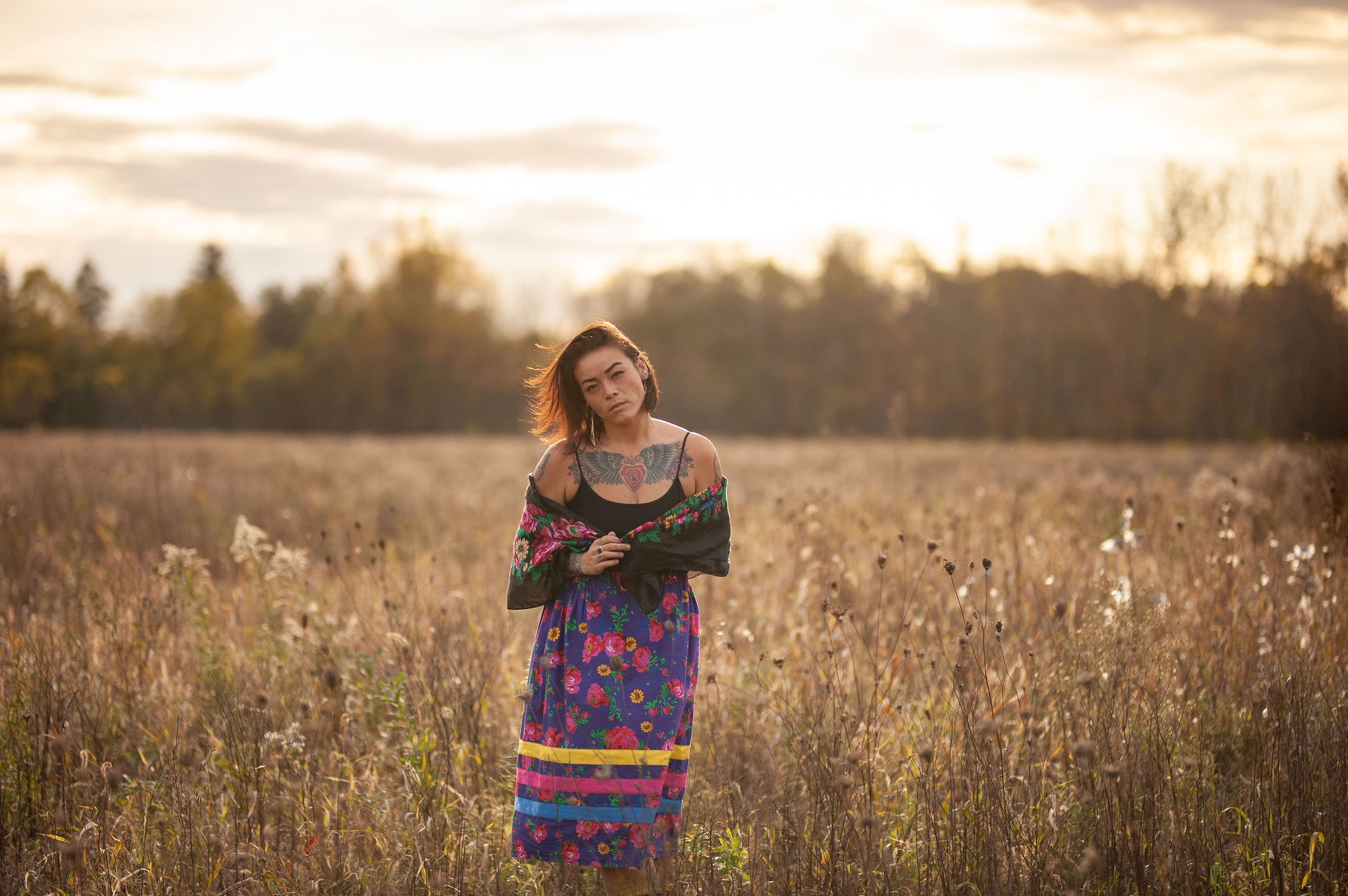
When: Sunday, July 9th, 2023, from 3:00-4:30 pm (EDT)
Where: This is an online screening.
Film Synopsis
This short film shares the self-narrated story of filmmaker and water protector Layla Staats on her path to reclaim her cultural (Mohawk) identity. As a generational survivor of residential schools, they took her culture from her, but watch her story as she takes it back. And it all started with the water.
“This film shares some of the most important lessons I’ve learned on my road to reclaiming my Mohawk identity and a deeper look at how residential schools impacted me even though they had closed many years before I was born. I know I am not alone. This is not just my story. This film goes out to everyone else that is walking the Red Road.”
WATCH: ‘Blood & Water’ Trailer
Express your solidarity with Indigenous women and 2SLGBTQIA+ land and water defenders by attending the film screening.
Mark your calendars for this Indigenous History Month event that you will not want to miss!
TAKE ACTION
Sign Amnesty International’s e-action that is calling on Prime Minister Justin Trudeau and Public Safety Minister Marco Mendicino to respect the inherent rights of Indigenous Peoples and end violence against Indigenous women girls, Two-spirit and gender diverse people.
Listen to land and water defender Kanahus Manuel talk about the impact of ‘man-camps’ on Indigenous women, girls and gender diverse people and support the Tiny House Warriors’ Mutual Aid Fund.
Support the Wet’suwet’en Nation’s land and water defense Solidarity Fund.
Support the Grassy Narrows Land Alliance Rally in Toronto on July 20.
Create solidarity banners to show your support for Indigenous women and 2SLGBTQIA+ land and water defenders in your community!
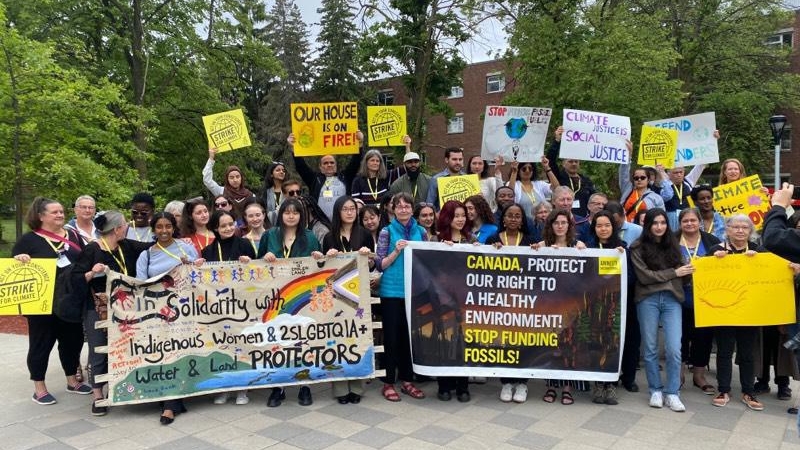
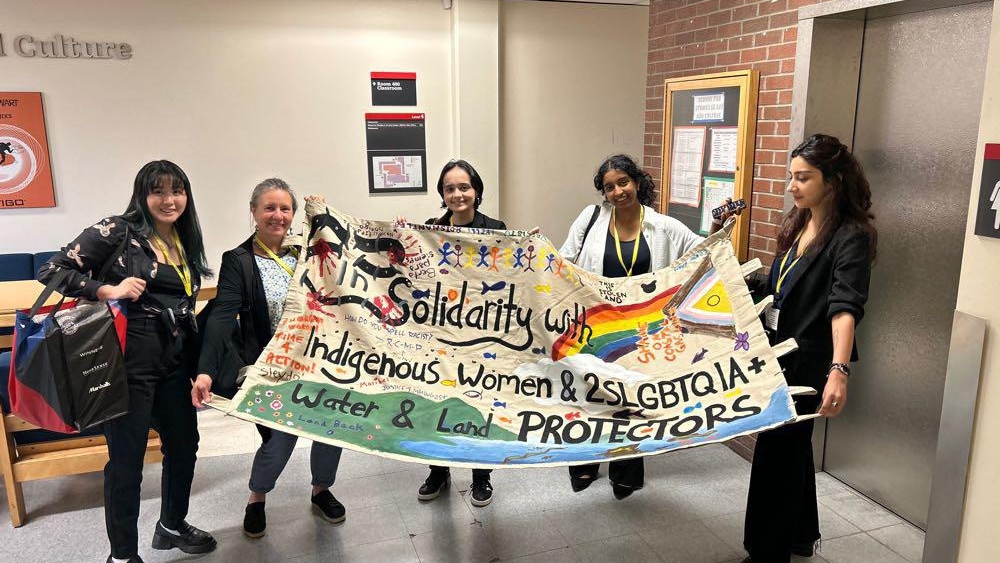
LEARN MORE
- Listen to the Wet’suwet’en Nation share its struggle to defend its unceded, ancestral territory against the construction of the Coastal GasLink pipeline before the Inter-American Commission on Human Rights. You can watch a recording of the hearing on YouTube.
READ MORE
- Read Amnesty International’s recent submission to the Universal Periodic Review, in which we raise concerns about human rights violations experienced by Indigenous Peoples in Canada: Human rights in Peril. Amnesty International. (Submission to the 44th session of the UPR Working Group, 10 November 2023).
- Read Amnesty International’s policy brief: Stop burning our rights! What governments and corporations must do to protect humanity from the climate crisis. (June 7, 2021)
- Read the National Inquiry’s Calls for Justice for All Canadians (page 199) to learn more about how you can support Indigenous women and gender-diverse defenders and peoples holistically.
- Read Amnesty International’s 10 Ways to be a Genuine Ally to Indigenous Communities, which shares concrete steps to practice meaningful allyship and solidarity with Indigenous Peoples.
GET SUPPORT
- A 24-hour National Indian Residential School Crisis Line is available to support survivors and impacted loved ones. To access the crisis line, please call: 1-866-925-4419.
- 24-hour mental health counselling and crisis support are available for survivors throughout the week. Please call the Hope for Wellness hotline at 1-855-242-3310 or by online chat.
- To find more services and support near you, please access the Native Women Association of Canada’s Culturally Safe and Trauma-Informed Knowledge Hub.
Header photo: Secwépemc Elders Sacred Fire in Turtle Valley B.C. Hereditary Descendant Chief, Matriarchs, Elders and members rallied against the BIOSolids dumping on unceded Secwépemc territory in Turtle Valley which was done without the Nation’s Free, Prior and Informed Consent. Community members brought their children to the Sacred fire to support the Elders and to learn about the turtles, their connection to Mother Earth and their responsibilities as Caretakers. Credit: Judy Wilson





















